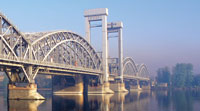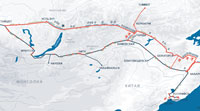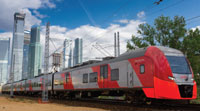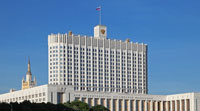Personnel management
Russian Railways views its personnel as its primary asset and a valuable resource. Recruiting and retaining personnel with the required skills along with their continuous development and social support are the top priorities of the Company’s personnel policy.
Personnel numbers and structure
Percentage of employees with a higher education in 2014 26.9 % of total personnel, a 2.1% increase from the start of 2014
Russian Railways had 835,800 employees as of 31 December 2014, a decrease of 66,900 people from a year prior. As a result of the Company’s social policy, the personnel turnover rate fell by 0.4 percentage points compared with 2013 to 8.4%.
Russian Railways carried out planned downsizing of 3% in accordance with its previous plans.
The educational level of personnel continued to expand in 2014. In particular, employees with a higher education made up 26.9%% of total personnel, a 2.1% increase from the start of last year.
Labour productivity
Russian Railways has carried out systematic work since its establishment to ensure growth in labour productivity.
Labour productivity for transportation businesses increased 10.6% in 2014 compared with 2013 and totalled 4,593,000 virtual tkm/person.
In addition to the increase in transportation volumes, the Company boosted labour productivity through downsizing as a result of measures in such as areas as the introduction of new machinery and equipment, improvements to technological processes, the introduction of automated workstations, the intensification of production processes and the introduction of quality management and a lean manufacturing system.
The Company has developed a programme to increase labour productivity in
Remuneration and improving personnel motivation
Growth in the average monthly salary of Russian Railways employees in 2014 totalled 5.6 %
The Company was able to increase employee salaries 5.6% compared with 2013 as a result of the systematic implementation of a set of measures to improve labour productivity
| Indicator | 2010 | 2011 | 2012 | 2013 | 2014 |
|---|---|---|---|---|---|
| Average monthly salary of Russian Railways employees engaged in all types of activities, RUB | 28,930 | 33,130 | 35,702 | 38,935 | 41,126 |
| Growth vs. previous year, % | 117.6 | 114.5 | 107.8 | 109.1 | 105.6 |
| Ratio of salaries of Russian Railways employees vs. national average | 1.38 | 1.42 | 1.34 | 1.31 | 1.26 |
The Company makes concerted efforts to improve the remuneration and motivation system for personnel.
A regulation on lump sum remuneration for employees of Russian Railways divisions for length of service on the Baikal-Amur Mainline was introduced in 2014 to recruit and retain skilled workers at Company divisions operating in this region.
The system of material incentives for Company employees has:
- improved the quality of work while maintaining the trend of improved traffic safety and operation on the railway network and increasing the service speed of freight train traffic and freight delivery speed;
- improved labour productivity;
- reduced transportation costs;
- reduced downtime by locomotive crews.
Training and instruction of personnel
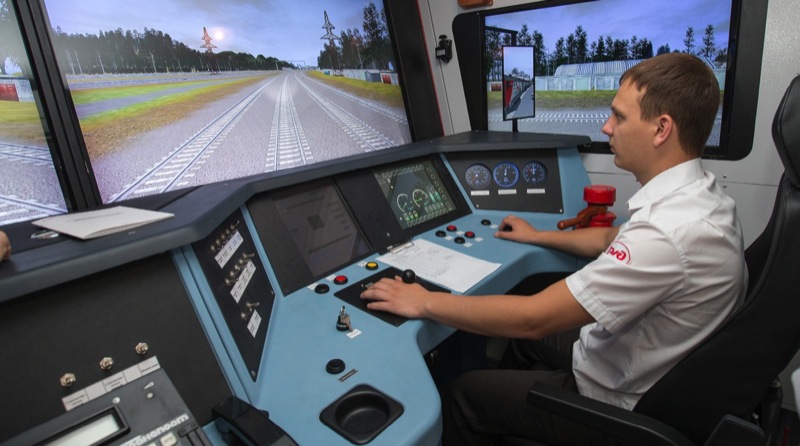
The Company has established a unique corporate system of vocational training comprised of 15 vocational training centres that meet the demands of the Company’s divisions for skilled personnel in the main railway professions. At present, more than 42,000 students are studying at railway universities under orders from Russian Railway.
Training was held at the Russian Railways Corporate University in 2014 for 4,900 executives
Advanced training at various training centre courses and in the workplace in 2014 was provided to more than 153 thousand people A total of 83,300 people underwent advanced training in 2013
Training conducted on leading professions in 2014 for more than 52 thousand people
During the reporting year, some 15,700 people studied in engineering training programmes based at railway transportation universities. A number of training programmes were implemented in strategic areas of development for the Company. In particular, some 2,100 people trained under the ‘Lean Manufacturing’ programme, while 128 people studied under the ‘Development of an integrated rapid transit and high-speed transportation network in the Russian Federation’ programme (at a specialised department of Moscow State University of Railway Engineering).
Some 4,900 executives from the Russian Railways Group underwent training at the Russian Railways Corporate University in 2014.
International internships were also held in 2014 with Russian Railways Group executives travelling to the Netherlands, South Korea and Japan to gain experience.
Collective bargaining agreement
Social and labour relations at the Company are governed by the Russian Railways collective bargaining agreement, which is concluded for a period of three years and protects the interests not only of Company employees and their families, but also retirees. The current collective bargaining agreement runs from 2014 through 2016.
The housing policy implemented as part of the Russian Railways collective bargaining agreement provides subsidised mortgage loans for Company employees to purchase housing. In 2014, 2,300 employees received subsidised mortgage loans for a total of RUB 4.3 bln.
The Company has employed a target programme called ‘Russian Railways Youth’ since 2006 to form a professional and personalised team of young people and involve them in creative and active work to benefit Russian Railways and the Russian economy.
Improving the living standards of current and future pensioners is a priority in the social policy of the Russian Railways Group.
Private pensions from the Blagosostaynie Private Pension Fund provide Russian Railways employees an additional opportunity to meet their desired living standards after retirement.
More than 272,000 former railway workers currently receive a corporate pension. Pensions were granted to 15,681 Russian Railways employees in 2014 with the average private pension totalling RUB 5,968.
More details on the Russian Railways social policy can be found in the Company’s annual social report at www.rzd.ru

